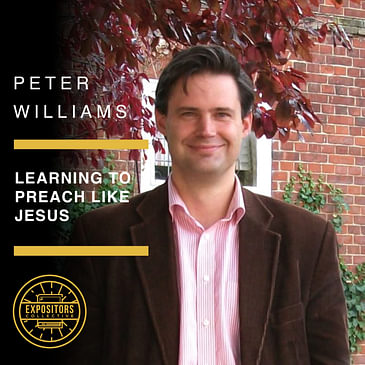Many people consider Jesus to be a great teacher and preacher, but few actually realise just how incredible and multilayered His teachings actually were.
In this episode of Expositors Collective, Mike speaks with Dr. Peter J. Williams, the principal of Tyndale House in Cambridge, and the chair of the International Greek New Testament Project. He is also a member of the ESV Translation Oversight Committee, and the author of several books, including: Can We Trust the Gospels?
Dr. Williams’ latest book is called The Surprising Genius of Jesus: What the Gospels Reveal about the Greatest Teacher, in which he examines Jesus’ teachings in the Gospels and shows how we know that these teachings truly do originate with Jesus, and that they show an incredible awareness of, and connection to the Old Testament in a way that would have triggered the memories of the first listeners, and which contains layers of meaning for us as readers today. Peter also gives insight into fruitful evangelism, unlocking of knowledge and some of the ways that Tyndale House can help ordinary preachers like us!
-
Dr Peter J. Williams is the Principal and CEO of Tyndale House, Cambridge. He was educated at the University of Cambridge, where he received his MA, MPhil, and PhD in the study of ancient languages related to the Bible. After his PhD, he was on staff in the Faculty of Divinity at the University of Cambridge (1997–1998) and thereafter taught Hebrew and Old Testament as an Affiliated Lecturer in Hebrew and Aramaic at the University of Cambridge and Research Fellow in Old Testament at Tyndale House, Cambridge (1998–2003). From 2003 to 2007 he was on the faculty of the University of Aberdeen, Scotland, where he became a Senior Lecturer in New Testament and Deputy Head of the School of Divinity, History, and Philosophy. Since 2007 he has been leading Tyndale House. Dr Williams is also an Affiliated Lecturer in the Faculty of Divinity in the University of Cambridge, Chair of the International Greek New Testament Project and a member of the Translation Oversight Committee of the English Standard Version of the Bible. He assisted Dr Dirk Jongkind in Tyndale House’s production of a major edition of the Greek New Testament and his book Can We Trust the Gospels? (Crossway, 2018) has been translated into 13 languages. His latest book, The Surprising Genius of Jesus: What the Gospels Reveal about the Greatest Teacher (Crossway), was published in October 2023.
Resources Mentioned:
Tyndale House - Exceptional research by people serious about Scripture: https://tyndalehouse.com/
Peter J Williams speaks on the surprising genius of Jesus at the Southern Baptist Seminary Gheens' Lectures 2023 in Louisville, USA. https://tyndalehouse.com/explore/videos/the-surprising-genius-of-jesus/
Recommended Episodes:
Amy Orr-Ewing: https://cgnmedia.org/podcast/expositors-collective/episode/apologetics-persuasion-and-evangelism-amy-orr-ewing
Frederick Dale Bruner: https://expositorscollective.org/expositors-collective-podcast/pastoral-and-scholastic-earthiness-frederick-dale-bruner/
Kieran Lenahan: https://cgnmedia.org/podcast/expositors-collective/episode/scripture-memorization-and-spiritual-formation-with-kieran-lenahan
Amy Orr-Ewing :
-—————
Connect:
For information about our upcoming training events visit ExpositorsCollective.com
The Expositors Collective podcast is part of the CGNMedia, Working together to proclaim the Gospel, make disciples, and plant churches. For more content like this, visit https://cgnmedia.org/
Join our private Facebook group to continue the conversation: https://www.facebook.com/groups/ExpositorsCollective
Click here to support Expositors Collective





